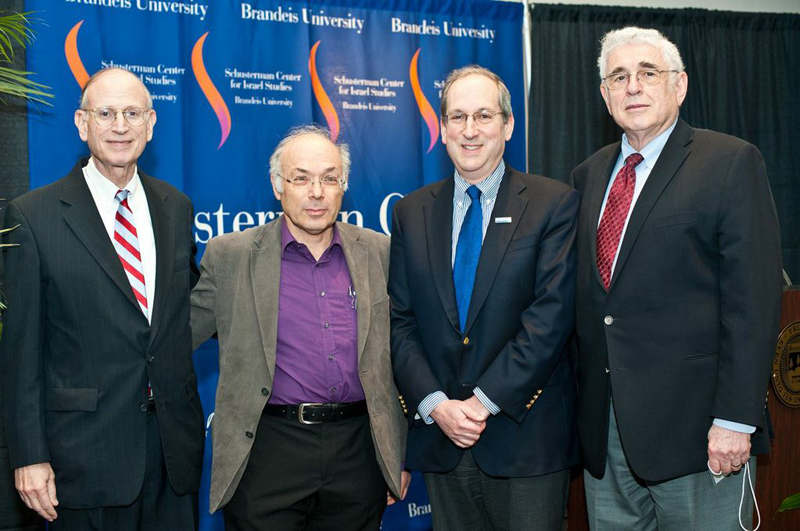Conference looks at impact of the Holocaust on Israel
 Photo2/Ashley McCabe
Photo2/Ashley McCabeFrom left, Ambassador Stuart Eizenstat, Dan Michman, Frederick Lawrence, and Ilan Troen
The Schusterman Center for Israel Studies at Brandeis, with co-sponsorship by the Israel Institute and by the Center for German and European Studies at Brandeis, presented an international conference April 27-28 that explored the impact of the Holocaust on Israel and its art, literature, music, foreign policy, politics, Zionism, memory, and identity.
The meeting, entitled “The Shoah in Israeli Culture, Memory and Politics,” opened with a videotaped message from Nobel laureate Elie Wiesel. Dan Michman, of Bar-Ilan University and Yad Vashem, presented the first of two keynote talks, “Is the Holocaust Different from other Genocides?” Yehudah Mirsky, associate professor in the department of Near Eastern and Judaic Studies and the Schusterman Center for Israel Studies at Brandeis, presented the other, “Facing the Hidden God of History: Religious Zionism and the Holocaust.”
Ilan Troen, the Stoll Family Chair in Israel Studies and director of the Schusterman Center for Israel Studies, chaired the conference, which took place over Holocaust Remembrance Day (Yom HaShoah), which was observed Sunday evening, April 27, through Monday. The conference was open to scholars and the public, and drew members of the community from the Boston area and beyond.
"Fully one-fourth of the population of Israel after independence were Holocaust survivors as compared to nearly negligible numbers in the U.S. and elsewhere," said Troen. "The Shoah inevitably has left an imprint on Israel as nowhere else."
Other speakers included Ambassador Stuart Eizenstat, special adviser on Holocaust issues to Secretary of State John Kerry, Mooli Brog, head of education for Taglit-Birthright Israel, and faculty from Hebrew University of Jerusalem, Tel Aviv University, Brandeis, Harvard Divinity School, Indiana University, University of Pennsylvania, and University of Virginia, among others.
A banquet held Sunday evening featured a musical program presented by Josh Jacobson of Northeastern University and Hebrew College, “Tsen Brider (10 brothers); A Russian-Jewish Folk Song Becomes a Concentration Camp Requiem.” The Zamir Chorale of Boston, which Jacobson founded and serves as its artistic director, performed several pieces for the assembled guests.
Prior to the start of the conference, the Schusterman Center held a workshop for alumni of its Summer Institute for Israel Studies (SIIS) Fellowship, a program that trains faculty in the humanities and social sciences to design courses on Israel Studies in a broad range of disciplines. The workshop shared the conference theme, with a pedagogical focus. Dan Michman delivered the workshop's keynote talk, “Shoah, Churban, Cataclysm, Judeocide, Holocaust, Genocide (and More); On Terminology and Interpretation.”
Also presenting at the workshop were Jan Darsa, director of Jewish education at Facing History and Ourselves, and Tuvia Friling, of Ben-Gurion University of the Negev, currently a visiting professor at Brandeis and the Schusterman Center. Approximately 40 SIIS Fellows from across the globe, including India, Hungary, Romania, Ukraine, the United Kingdom, and North America, attended the workshop and the conference.
The conference was recorded and will be available for viewing the Schusterman Center website soon.
Categories: Humanities and Social Sciences





